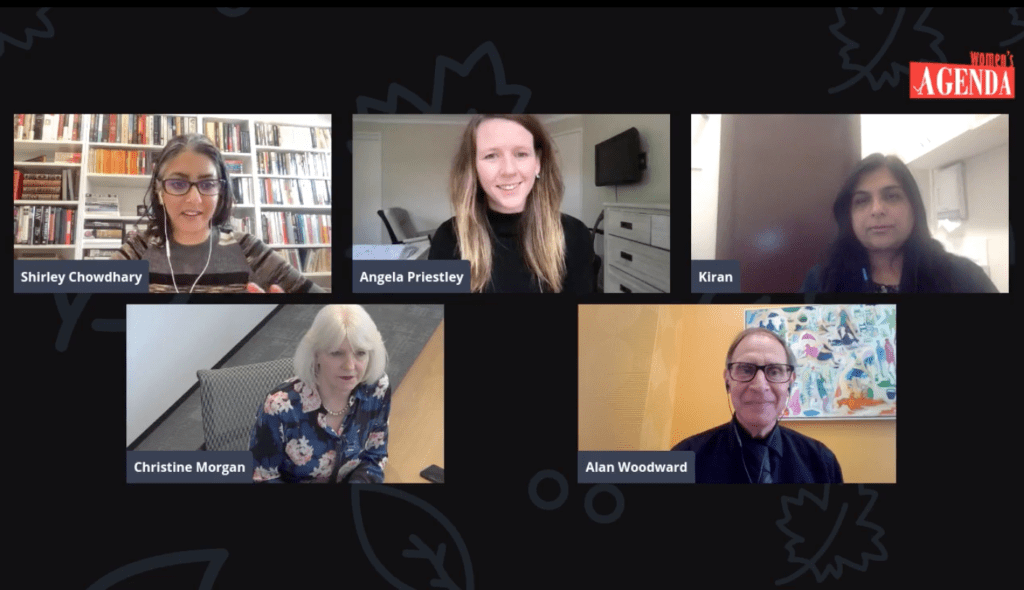Lockdowns are hard. Whether you’re currently in one, you’re still recovering from one, or whether you’re worried about the next one.
So what can we do to manage our mental health during all this uncertainty? What do the experts recommend?
Today, thanks to some fast organizing skills by The Leadership Lessons host Shirley Chowdhary, we had an opportunity to find out.
On the #MindSpace panel we heard from Mental Health Commissioner Alan Woodward, GP Dr Kiran Jassal and CEO of the National Mental Health Commission, Christine Morgan.
First up, we discussed why these times are particularly challenging on our mental health. It starts with ‘pandemic fatigue’: the novelty of the Zoom catch-ups and the puzzles and chalk messages and teddybears in windows have all well and truly worn off. And most of us didn’t really expect to still be managing lockdowns in 2021.
“We are fatigued at having to cope with the lockdowns,” said Morgan.
“It just doesn’t seem to end. It’s like trying to run a marathon. Losing energy. Running out of steam. Coming off a low base. Manifesting itself in different ways. Creating a short fuse. We don’t have the same capacity to be kind. We’re tired.”
From there, there’s the uncertainty about when and how this all ends. The goalposts keep shifting. Indeed, we recorded this session today just as NSW announced its highest number of COVID-19 case numbers since the beginning of the Pandemic began, and hours before Victorians learned they would be going into yet another lockdown.
And importantly, there are the unique and specific challenges people are facing, creating different challenges with different levels of support available. Some are living alone and isolated. Others are managing remote learning and caring responsibilities on top of their paid work. Some are facing significant financial stress, and others again are facing their own fears and stress in other aspects of their lives. For families, Dr Jassal noted how the “Routine, Ryhtm and Ritual and the safety net these things provide have largely been lost during lockdown”.
Below are some of the key tips shared during the virtual panel session.
Remember help is available
There are numerous helplines available to support Australians during this period — and Australians are using them, with a record number of calls to Lifeline on Monday (something Woodward saw a positive in, given it shows we are reaching out). Other options include BeyondBlue, Kids Helpline, 1800 Respect, MindSpot, eHeadspace, Beyondblue, ReachOut.com. Also, there is the national online digital mental health portal, HeadtoHealth.gov.au.
Woodward noted some of the benefits of these helplines and services, saying they give “convenience, confidentiality and control over how you interact.”
Dr Jassal added that if low feelings are interfering with your life, that you should contact a doctor. “Go and seek help sooner rather than later,” she said.
You’re not alone in “COVID heaviness”
Dr Jassal said a lot of women are approaching her practice, saying they are unable to cope. They are frustrated, exhausted and running on empty. “Many of my patients were already exhausted and overwhelmed with their workload while working online and the Lockdown has truly exacerbated that.”
She stressed that while GPs will always ensure there are no other underlying issues at play, that these feelings of burnout and frustration are increasingly common.
Kindness is everything
The K-word came up over and over again during this session, with panelists noting the need to not only be kind to each other but also to ourselves. “In the midst of chaos, kindness rules,” Woodward said.
“We should recognise the benefits of taking time for ourselves, and not always upholding great expectations of what we can do – or how difficult situations should be resolved. Use nature and enjoyable activities to lift your mood. Make sure the basics are right: sleep, exercise and diet.
“Kindness matters,” Woodward continued. The more we are kind towards others the more our own mental health rises. And sometimes the only thing that you can do in a difficult situation is show kindness – it is within your power to do so.
Connect with others
Many people are withdrawing during these current lockdowns, Morgan said. She added that while in 2020 we learned to connect better with each other, the pandemic fatigue means we’re starting to disconnect. We need to turn that around and again see the value in those phone conversations and virtual meetings.
Replenish yourself
Looking after yourself at this time is not an indulgence, it is self-care, said Morgan.
She recommended building some kind of self-care into your day, whether that’s reading, exercising, taking a bath or something else.
She also advised people to eat and sleep as well as they can, and to take breaks from the constant need to know everything about what is going on.
“Create an Oasis for yourself,” Morgan said. “Rebalance the scales by doing something indulgent for yourself.”
The National Mental Health Commission also recently released a number of tips for coping with ‘Pandemic Fatigue’ — which may include feelings/behaviours like tiredness, frustration, restlessness, irritability, lack of enthusiasm, increase substance abuse and hopelessness.
These strategies include:
- Identify and practice self-care strategies that work for you
- Keep kids communicating, let children know it is ok to be worried, and talk it out
- Exercise
- Reach out to those who may not have connections
- Follow facts from trusted sources
- Take a break
For help, please consider some of the following options:
Coronavirus Mental Wellbeing Support Services
1800 512 348 Lifeline: 13 11 14
Kids Helpline: 1800 551 800
www.headtohealth.gov.au


